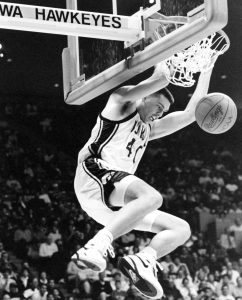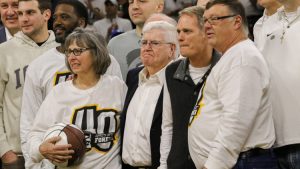A look back at the greatest comeback I’ve ever witnessed
Iowa's first game after death of Chris Street in 1993 produced an incredible comeback at Michigan State
Editor’s note: This article about the Iowa men’s basketball team’s dramatic come-from-behind victory at Michigan State on Jan. 28, 1993 was first published in Feb. 2019. It was Iowa’s first game since the death of Chris Street, and according to this column, it still ranks as the greatest comeback in program history because of the tragic and surreal circumstances. Iowa plays at Michigan State on Saturday and slightly more than 28 years after this legendary game took place. The Breslin Center has been the stage for many great college basketball games, but Iowa’s incredible come-from-behind victory in 1993 is in a class by itself.
By Pat Harty
IOWA CITY, Iowa – There are few things in sports that are more exciting than an improbable comeback.
Iowa fans were reminded of that last Sunday as Jordan Bohannon and members of the Iowa men’s basketball team overcame a 15-point deficit with less than five minutes to play to defeat Northwestern 80-79 at Carver-Hawkeye Arena.
Bohannon made a 3-point basket with .6 seconds remaining to complete what now ranks as one the greatest comebacks in program history, and that’s saying a lot because Iowa has had some incredible comebacks.
There was the miracle in Champaign in 1987 when Iowa, ranked second nationally and undefeated at 14-0, trailed No. 8 Illinois by 22 points with just under 16 minutes remaining. The Hawkeyes would go on to prevail 91-88 in a game in which both rosters were filled with future NBA players and with some of the best players in the history of both programs.
Both programs didn’t care for each other much at the time, either, so that just added to the intrigue and to the level of accomplishment.
Iowa pulled off another miraculous comeback against Kansas on Dec. 8, 1998 at legendary Allen Fieldhouse where the Jayhawks were trying to protect a 62-game home winning streak that dated back to 1994.
Senior shooting guard Kent McCausland made two 3-point baskets in the final 1:40 to lift Iowa to a stunning 85-81 victory.
As a team, Iowa went 8-for-11 from 3-point range in the second half, offsetting the Hawkeyes’ season-high 31 turnovers and Kansas’ 18 steals.
It truly was a surreal moment, and I still remember being in a panic from having to rewrite my game story late in the second half after having mistakenly assumed that Iowa would lose.
Everybody in the arena outside of the Iowa players and coaches made that same assumption because what are the odds of Kansas blowing a double-digit lead late in the second half at home of all places?
But as great as those three comebacks proved to be, there is one that stands above all others, and it’s not even close in my opinion.
I’m referring to Iowa’s 96-90 victory in overtime against Michigan State on Jan. 28, 1993 in East Lansing, Mich. The Hawkeyes overcame a 15-point deficit in the final 3 minutes to force overtime, and then Michigan State never stood a chance after that.
That gut-wrenching comeback stands above all the others because its impact and significance went far beyond sports.
Iowa was playing its first game without Chris Street, who was killed Jan. 19, 1993 in an automobile accident on the outskirts of Iowa City.
Street, in addition to being a talented 6-foot-8 junior forward, was also the team’s emotional leader and guiding force.
His death devastated the entire state and left the Iowa players and coaches in shock and disbelief.
It felt as if Street was there that night in East Lansing and that his spirit had carried Iowa to victory. His teammates and coaches out of love and respect refused to lose even when the odds of winning were slim to none.
And that’s why the 1993 comeback at Michigan State is in a class by itself.
Last Sunday’s comeback against Northwestern is now also part of Hawkeye legend and lore, but its impact didn’t transcend sports.
“There’s just nothing to compare to that type of comeback,” said Val Barnes, who helped lead the comeback at Michigan State by scoring 29 points and by making some huge 3-point baskets down the stretch.
Barnes was thrilled with his alma mater’s dramatic comeback last Sunday, but it didn’t cause him to think back to what he and his teammates and coaches accomplished at Michigan State in 1993.
“I really didn’t just because to me there are two different comebacks,” Barnes said.

Kenyon Murray grew up in Battle Creek, Mich., but chose to play for Iowa over scholarship offers from schools that included Michigan, Michigan State, UCLA, Kentucky and Notre Dame. Murray picked Iowa partly due to his respect and admiration for Street, who had befriended Murray during the recruiting process.
Needless to say, Murray was devastated by the loss of his new teammate and friend.
“You don’t envision yourself in that situation, said Murray, who was a freshman in 1993. “He meant so much to so many people. That was the bigger thing. You saw that he didn’t just touch you or your team, he touched an entire state.
“And I think just the magnitude of him not being there affected us all a little bit differently. But for me yes, especially. And I’m not saying my relationship was bigger or stranger than anybody else on the team. But for me personally, that was one of the biggest losses that I ever had in my life.”
Barnes and All-Big Ten center Acie Earl both led the comeback at Michigan State with their play on the court and with their influence and leadership in the huddle.
Iowa head coach Tom Davis had done a masterful job of helping the players cope with Street’s death in those mind-numbing days after the tragedy, but Murray remembers Davis being emotionally exhausted by the end of the Michigan State game.
Davis trusted that his two veteran stars would provide the right leadership and he gave them the space and freedom to express themselves.
Murray remembers that the momentum had started to shift after Iowa made back-to-back baskets in the closing minutes of regulation. He also remembers Earl taking charge of the huddle during a timeout and that the Michigan State players started to buckle under the weight of the comeback.
Michigan State head coach Jud Heathcote tried desperately to call a timeout in the closing seconds of regulation but neither his players nor the officials saw him.
“You just see them tightening and tightening and tightening,” Murray said of the Michigan State players. “And even until the end, when you watch the tape Jud Heathcote is jumping up and down on the sideline trying to get a timeout at the end of the game and none of the refs see him. The refs don’t see him. None of his players see him. And time runs out and we go into overtime. And once that hit, we knew we were good.”
“So there was a little hint of it early on. We has scored a couple baskets in a row. But it was really Acie and Val taking over the huddle and Tom not really saying a whole lot. It was just Acie and Val talking to us in the huddle and we just came out and got it rolling.”

Barnes was just relieved to be playing again after having his world turned upside down by an unthinkable tragedy.
Street was killed after having attended a team meal.
“We lost a family member and it was tough to deal with, all the different people coming up to you and reminding you of it,” said Barnes, who grew up in Wichita, Kan., and now lives in the Iowa City area. “You’re trying to lead a normal life, but you just couldn’t at that time.”
Barnes credits Street’s spirit for lifting them to victory under what seemed like insurmountable odds.
“Chris was one of those guys that helped make the practices very competitive, too,” Barnes said. “You know, a little trash talk or what not, especially if the starters weren’t playing well. He would challenge people.
“So yeah, we wanted to continue to play and play with that energy and effort that he brought to the table.”
The Michigan State comeback never is far from Murray’s thoughts, even all these years later. He said he still thinks about it “all the time.”
“Whenever I watch Michigan State, whenever I watch them play, especially when we match up against them,” Murray said. “Whenever people ask me about some of my greatest memories, even though that was part of a tragedy, that game and obviously the Michigan game at home, those are two moments that stand out to me all the time.”
The Michigan game at home to which Murray referred was Iowa’s 88-80 victory that occurred just three days after the Michigan State comeback.
It was the first game at Carver-Hawkeye Arena since Street’s death and it came against Michigan’s legendary Fab Five.
Iowa would go on to finish 23-9 that season and advance to the second round of the NCAA Tournament.
But there was so much more to that season than wins and losses.
Hawkeye fans rallied around the men’s basketball team and both sides helped each other cope.
I had the privilege of sitting near the Iowa bench while covering the game at Michigan State in 1993 for the Iowa City Press-Citizen. I’ll never forget the look on Tom Davis’ as he grinded through the game. Davis and the players all seemed to be in a fog, and yet, they still found a way to persevere and to prevail.
And I’ll never forget the number 40 that Earl had shaved on the back of his head in honor of Street’s jersey number. Earl pointed to his head as he left the court with his victorious teammates.
I will also never forget a Michigan State fan telling me after the game that he didn’t really mind losing that night because of the unusual circumstances.
The entire Big Ten community was impacted by Street’s death and Murray is reminded of that when crossing paths with current Michigan State head Tom Izzo in the years after the tragedy.
Izzo was Heathcote’s top assistant in 1993.
“I’ve talked to coach Izzo before about this and he said that was one of the best losses that he’s ever had, that he’s ever been a part of,” Murray said. “If there was a game that they lost, he’d lose that game over and over again.
“That just shows how classy he and coach Heathcote were and the rest of the staff. It was almost like once we got to overtime, they were like we don’t deserve to win and we shouldn’t win.”
One thing that can’t be overstated is the leadership and love that Davis provided during that brutal time. He truly was like a parent to his players because that’s what they needed at the time, in addition to a head coach.
“Like I’ve told many people; Tom was the ideal coach of that situation to be able to get us through it,” Murray said. “We were wearing our emotions on our sleeves that night. So I think if we would have lost by thirty points nobody would have blamed us.”
Murray is right about that.
But instead of losing by 30 points, Murray and his cohorts rallied and pulled off the greatest comeback in program history. And it’s not even close.



